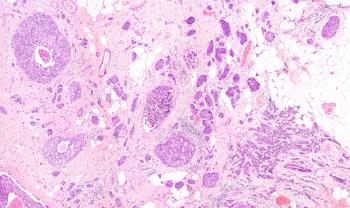
This study demonstrated that the concurrent use of this new artificial intelligence tool alongside mammography improved the diagnostic performance of radiologists in the detection of breast cancer without prolonging their workflow.

Your AI-Trained Oncology Knowledge Connection!


This study demonstrated that the concurrent use of this new artificial intelligence tool alongside mammography improved the diagnostic performance of radiologists in the detection of breast cancer without prolonging their workflow.

This study found that abbreviated breast magnetic resonance imaging as a supplemental screening test in women with dense breasts shows an increase in cancer detection over digital breast tomosynthesis screening.

“This algorithm could allow us a better shot at personalized medicine and enhance our ability to tailor the treatments to be as appropriate as possible,” said study author Daniel Chang, MD.

The chief executive officer and co-founder of TrialJectory spoke about the online tool and what it offers for patients, providers, and pharmaceutical companies.

This study created and assessed a parsimonious radiomic model that was able to identify a vulnerable subset of screen-detected lung cancers that are associated with poor outcome.

In this study, investigators found that the hydrogel spacer has a favorable risk-benefit profile for patients receiving radiotherapy for prostate cancer.

The deep learning survival neural network model demonstrated the potential to provide personalized treatment recommendations based on real clinical data in patients with non-small cell lung cancer.

Cellectar opens manufacturing facility for radiolabeled CLR1404

MRI has outrun other modalities in a screening trial involving high-risk women. Such research helps justify an estimated $1.4 billion a year in direct costs for the United States if new American Cancer Society guidelines

Breast MRI identifies mammographically occult secondary tumors in about 6% of women with early-stage breast cancer who would otherwise qualify for partial breast irradiation

Merck and Idera to develop TLR9 agonists for treatment of cancer

A cutting-edge prognostic tool called MammaPrint, developed by Agendia, a laboratory located in The Netherlands, uses molecular technology to predict whether breast cancer will metastasize, helping clinicians make more accurate management decisions for their patients.

Positron emission tomography (PET) can be used to better characterize patterns of local failure after definitive radiation therapy for non-small-cell lung cancer, which may help to improve that therapy

Use of accelerated partial breast irradiation (APBI) with multicatheter brachytherapy to treat resected early-stage breast cancer is associated with good early outcomes in terms of local control, adverse effects, and cosmesis

Buoyed by effective postprocessing techniques, modern multislice CT has swept away some of the modality's limitations in visualizing the complex pancreas and created new challenges for radiologists in assessing incidentally detected lesions

Georgia Cancer Specialists (GCS), a large Atlanta-based oncology practice, has made available a free website, ChemoOrders.com, offering chemotherapy protocol order forms.

Cancer patients receiving chemotherapy have not noticed a restriction in their access to treatment following the enactment of the Medicare Prescription Drug Improvement and Modernization Act of 2003

A major issue facing radiologists who use computer-aided detection systems for early detection of lung cancer is deciding when a CAD finding truly represents malignancy.

An Arizona woman will always remember the incident that was nearly as frightening as learning that she had cancer. The incident was being left inside a PET/CT scanner after the imaging center was locked up and staff had gone for the day.

New technology from InNexus Biotechnology, known as Dynamic Cross-Linking (DXL), could be used to improve the target-binding affinity of existing monoclonal antibodies (MoAbs) as well as those in development.

US Food and Drug Administration (FDA) has granted an expanded clearance for the CellSearch System to be used as an aid in the monitoring of metastatic colorectal cancer

The high cost of implementing new technologies has slowed the adoption rate of health information technologies, especially among smaller oncology practices. Based in Rockville, Maryland, Argole Systems, Inc. is a software and services company that recently released the beta version of Akessa Oncology, its new oncology-specific practice management and EMR system. Cancer Care & Economics spoke with Argole president, CEO, and co-founder Masoud Khorsand, MD.

10 notable developments and events in cancer research and care

Angiogenesis is the process of new blood vessel growth. In malignant tumors this process is essential for the delivery of needed nutrients and oxygen for the continued growth and survival of cancer cells. Thus the process of angiogenesis and the subsequent development of therapies that inhibit the process have generated great interest since Judah Folkman's original hypothesis was presented over 3 decades ago. Folkman's studies in the 1970s sparked interest in the science of angiogenesis and led to the first specific therapy to inhibit angiogenesis, but it was not until 2004 that the first antiangiogenesis agent, bevacizumab (Avastin), was approved by the US Food and Drug Administration (FDA) in combination with chemotherapy. Since then, two multitargeted or dual action oral agents have been FDA-approved. Advances have also been made in understanding the science of antiangiogenesis, which has contributed to the design of agents as well as clinical trials in the treatment of several tumor types and is being studied actively in many others.

past decade has witnessed a host of technologic improvements in prostate cancer therapy. The three major modalities offered in most managed care plans include radical prostatectomy, external-beam radiation therapy (EBRT), and interstitial brachytherapy (seed implant). Continued technologic advancement has led to incremental improvements in the safety and effectiveness of each modality. However, these improvements have led to a significant increase in the cost of treatment.

Larry Norton, MD, is a gardener in the truest sense of the word. He is planting an idea (tumor self-metastasis) that could ultimately grow into a new way to understand and treat cancer. For decades, Dr. Norton, of Memorial Sloan-Kettering Cancer Center, accepted that cancer is a disease of cell division not unlike an acorn giving rise to an oak tree.

For clinicians, MRI may offer a more in-depth view than mammography for planning surgery and screening for contralateral breast cancers, but does use of MRI actually benefit patients?

Compared with optical colonoscopy, CT colonography achieves similar outcomes with a fraction of the number of polypectomies

Wedding high technology to recent advances in understanding the molecular biology of oral squamous cell carcinoma

Increasing experience with magnetic resonance imaging (MRI) has raised important questions about how it should be used in breast cancer screening, and for presurgical evaluation and posttherapy follow-up of women with this disease. Overall, the availability of MRI as an adjunct to mammography and ultrasound offers clear clinical benefit to women at increased risk of breast cancer development due to BRCA1 and BRCA2 mutations, and to women presenting with axillary adenopathy and an occult primary breast tumor. In contrast, its benefit for routine selection of breast conservation or further assessment of lobular carcinoma in women of average risk has not been demonstrated.This article reviews the use of MRI in these settings, with an emphasis on the clinical outcomes that have been observed to date.